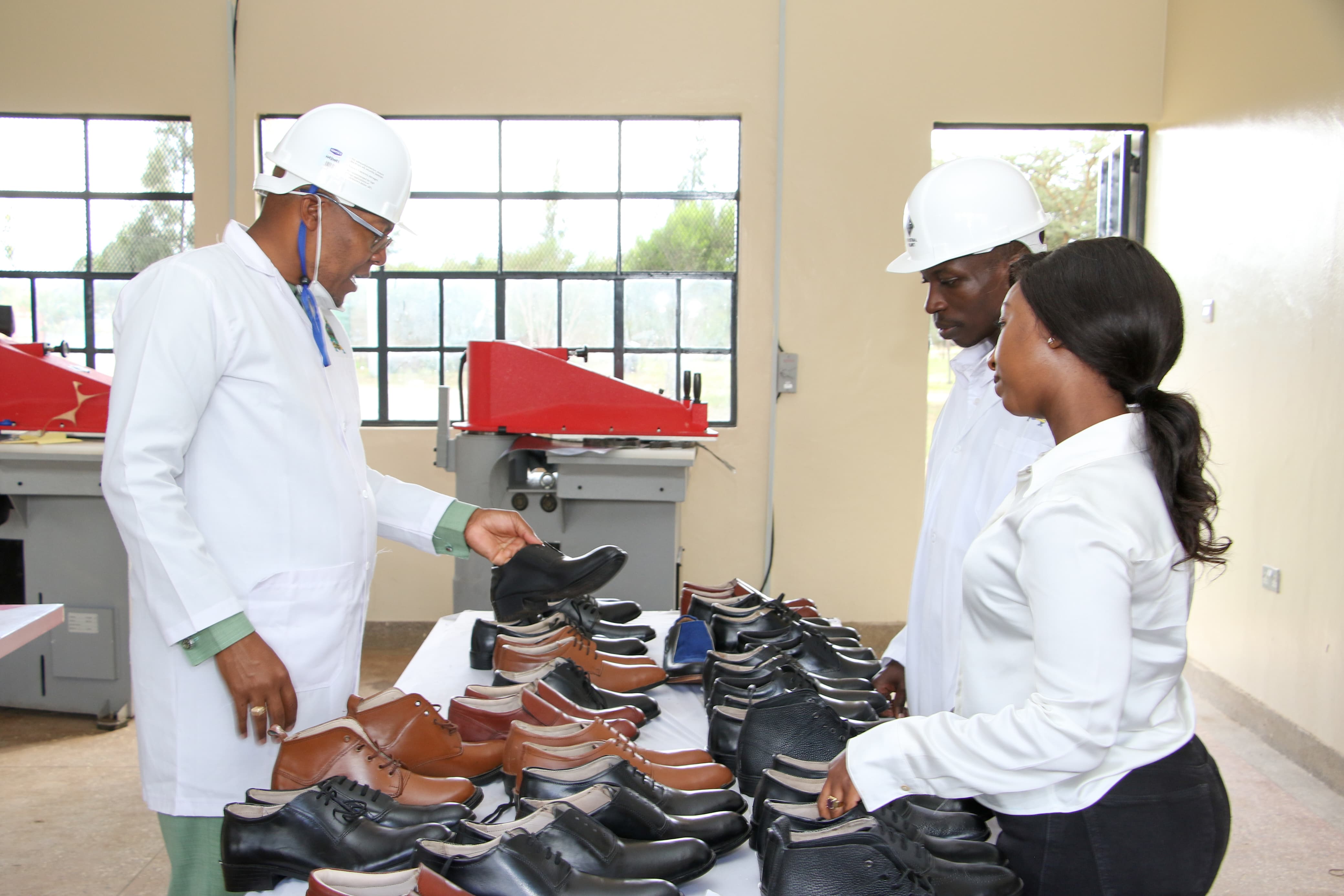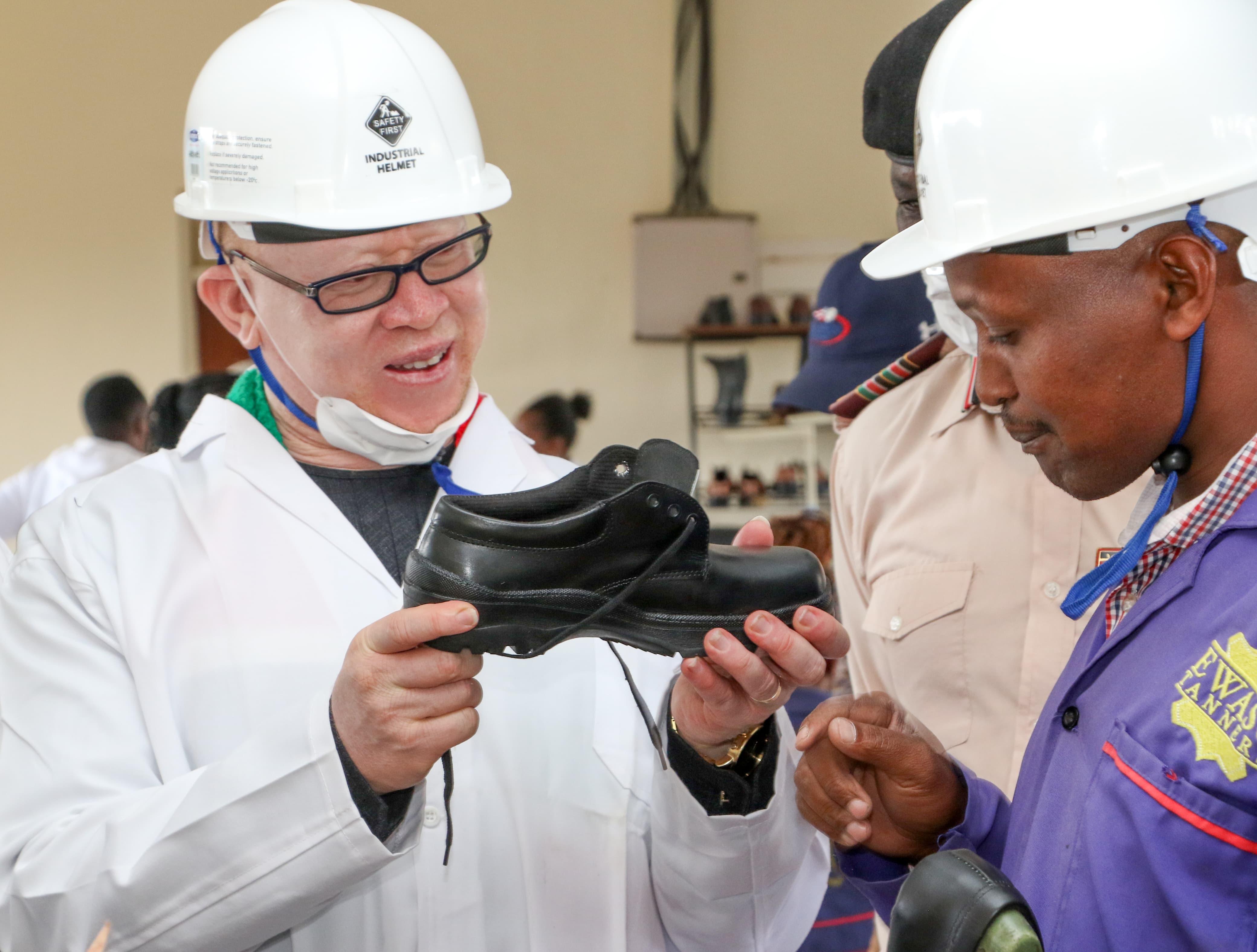 Deputy Government Spokesperson Mr. Gabriel Muthuma
(left) shows his fellow staff members the durable shoes being produced at the
Ewaso Ng'iro Tannery and Leather factory in Kajiado County./OGS
Deputy Government Spokesperson Mr. Gabriel Muthuma
(left) shows his fellow staff members the durable shoes being produced at the
Ewaso Ng'iro Tannery and Leather factory in Kajiado County./OGSHides and skins have been thrown to the dogs for long.
In Narok County, livestock farmers never knew of the additional value of the by-products from their dairy and beef cattle.
They had no option but to discard them to waste until the government came to their aid by constructing the Ewaso Ngïro Tannery and Leather Factory back in 2019 at a cost of Kshs1.4 billion.
This action, the Government Spokesperson Dr. Isaac Mwaura says, formed the founding of the first public leather company in the country currently being run jointly by the National Government and Narok County Government in utilizing the hides and skins to utilize hides and skins for production of leather products.
The Government Spokesperson made the remarks as he led a team from his office on an official tour to Narok county with the aim of publicizing government projects of which the leather factory is part, accompanied by his two deputies Mr. Gabriel Muthuma and Ms. Mwanaisha Chidzuga
The plant integrates a tannery and leather factory within a building measuring 3200 sq.ms with an effluent treatment plant (ETP) and is well equipped complete with machines installations alongside other utilities and auxiliary infrastructure.
 Government Spokesperson Dr. Isaac Mwaura admires a Go
back to School school at the Ewaso Ng'iro Tannery and Leather Factory during
his publicity tour of government projects in Narok County./OGS
Government Spokesperson Dr. Isaac Mwaura admires a Go
back to School school at the Ewaso Ng'iro Tannery and Leather Factory during
his publicity tour of government projects in Narok County./OGSAt full operations, the tannery promises a full turnaround of the region’s economic fortunes as the county alone hosts a livestock population of 1.2 million beef cattle, 300,000 dairy cows, 1.6 million sheep and 880, 000 goats.
Already, schoolgoing children from these communities embrace their academic years with confidence in their back to school shoes that are meticulously crafted to endure the daily hustle of the school life providing them with utmost comfort.
“The shoes which also include men’s official and casual footwear embody both resilience and style.” Dr. Mwaura adds.
The official men’s shoes epitomize style and comfort as they are crafted with precision and care.
Admiring the shoes at the disposal store, Dr. Mwaura agrees that the shoes are designed for the modern gentleman who values both aesthetics and functionality.
When not thrown to waste the hides and skins in the Maa custom communities were given to women and therefore with the coming of the factory they got a ready market for the products and nowadays they do their supplies business to the factory as part of government women empowerment projects.
Namunyak Salonik 34, one of the women traders with the factory narrates how the women in the area had benefited from the supplies business since the factory started operations enabling them to earn a living and educate their children.
“This factory has transformed our lives. In the past, we used to only dry and make mats or beddings out of the skins and hides but now the same are like gold to us when we get them, we bring them here and earn something,” Salonik says.
Salonik is highly appreciative of the factory’s humanitarian gesture to train and give them on cattle rearing methods to ensure that the livestock have quality skins for bigger earnings.
She regrets that for ages, they had been rearing their animals in a cultural and traditional way but after the trainings “we have attained knowledge on how to rear the cattle in a modern way producing quality skins for a better market.”
The factory’s Director for Human Resource and Administration Mr. Richard Tankile explains that the factory was poised to transform Kenya’s leather industry as it was significantly adding value to livestock skins and hides which were previously discarded as waste.
“This factory has assisted in changing livelihoods as most of the traders supplying skins and hides are locals to whom it has majorly created employment and assisted in value addition of their animal’s skins and hides,” Tankile notes.
Tankile adds that when traders take in hides and skins the factory’s staff first do selection depending on the quality and grade.
“We have been training the local community on modern livestock rearing so that we can get a good quality of the skins and hides which is an added advantage for them to get a good market,” he adds.
He states that the traditional livestock rearing method had been tampering with the quality of skins and hides hence making it a challenge when it came to getting market for the products.
“In capacity building and training we encourage the livestock keepers to avoid branding because when the cows are branded it destroys the skin and makes us unable to get premium quality of grade one and two at market time,” Tankile discloses.
Other things that affect the good quality of hides and skins are tick bites, fly cuts and gut-age marks and farmers are taught on how to get rid of them during the capacity building sessions.
He further adds that once the skins and hides are tampered with, the kilograms and quality goes down hence fetching low prices.
“Once the skin is tampered with, it hinders the kilograms and the quality thus making the trader get low payment as the prices vary with the kilograms and the quality,” he observes.
Tankile notes that the leather factory supplies the shoes it produces to the local market in the country as a way of promoting local industry in the spirit of buy Kenya, build Kenya.
“Our market locally is mainly Kariakor market in Nairobi and we look forward for international markets too so that we minimize and eradicate the import of leather,” he says.
Tankile wants the government to improve on funding to better the leather industry noting that Ewaso Ngiro factory like any other leather processing agency was facing a challenge of minimal funds allocated to it compromising its operations.
Dr. Mwaura said that Ewaso Ng’iro leather factory is a testament of fulfillment of the value addition promise by Kenya Kwanza government led by president William Ruto under BETA plan.
“The factory’s impact on employment and value addition is evident since many locals in Narok county are livestock keepers.
The women, youth and men are employed to provide labour at the various stages of turning animal hides and skin into leather,” he observed.
His deputy Ms. Chidzuga affirmed the Kenya Kwanza government’s commitment to promoting local industries for the benefit of local communities adding that plans were to have such industries across the 47 counties so as to boost the country’s economy right from the grassroots under the Bottom-up model.
“We used to throw hides and skins but now we have market for them and the locals are earning a living out of it, the government wants to have such industries at the grassroots to improve livelihood of the locals,” She said.
On his part Mr. Muthuma urged the residents to support the government’s plan to create up to 100,000 jobs opportunities in the leather sector positioning it as a Key economic booster to the country’s exports while it targets sh.120 billion in revenue creation.
The construction of 10 manufacturing facilities, completion of the Kenya Leather Industrial park and setting up tanneries are some of the strategies that the government is considering to boost leather industry.
The tanneries are to be set up in counties of Isiolo, Uasin Gishu and Mombasa as leather products are key value chains under the BETA plan.
“Besides textiles and apparel, dairy products, edible oil crops, tea and coffee, sugar and building and construction materials leather is a key value chain in the manufacturing sector.” Mr. Muthuma observed.
Munira Madano is a Public Communication Officer at the Office of Government Spokesperson


![[PHOTOS] Ruto at Pope Francis' burial](/_next/image?url=https%3A%2F%2Fcdn.radioafrica.digital%2Fimage%2F2025%2F04%2F844cb891-abd4-4ee5-bc2d-2a0c21fa3983.jpeg&w=3840&q=100)







